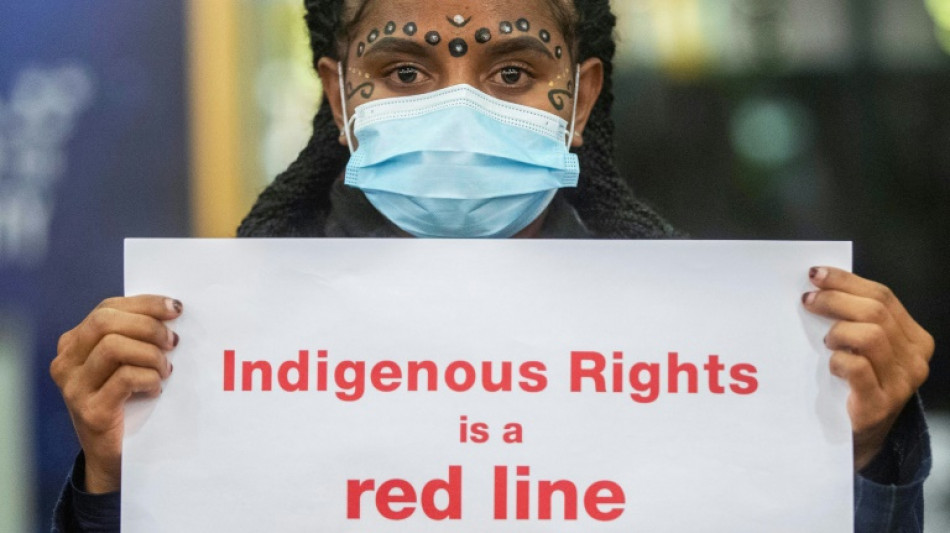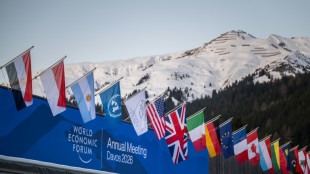
-
 EU leaders take stage in Davos as Trump rocks global order
EU leaders take stage in Davos as Trump rocks global order
-
Blast at Chinese restaurant in Kabul kills 7

-
 Warner hits 'Sinners' and 'One Battle' tipped for Oscar nominations
Warner hits 'Sinners' and 'One Battle' tipped for Oscar nominations
-
Colombian paramilitary-turned-peace-envoy sentenced over atrocities

-
 Gilgeous-Alexander leads Thunder in rout of Cavaliers
Gilgeous-Alexander leads Thunder in rout of Cavaliers
-
Seahawks blow as Charbonnet ruled out for rest of season

-
 Kostoulas stunner rescues Brighton draw after penalty row
Kostoulas stunner rescues Brighton draw after penalty row
-
Man Utd greats tell Martinez to 'grow up' as feud rumbles on

-
 LeBron James' All-Star streak over as starters named
LeBron James' All-Star streak over as starters named
-
Allies tepid on Trump 'peace board' with $1bn permanent member fee

-
 Ninth policeman dies in Guatemala gang riots, attacks
Ninth policeman dies in Guatemala gang riots, attacks
-
Man City's Foden to play through pain of broken hand

-
 Milan Fashion Week showcases precision in uncertain times
Milan Fashion Week showcases precision in uncertain times
-
Public media in Europe under unprecedented strain

-
 Africa Cup of Nations refereeing gets a red card
Africa Cup of Nations refereeing gets a red card
-
Tributes pour in after death of Italian designer Valentino

-
 Bills fire coach McDermott after playoff exit: team
Bills fire coach McDermott after playoff exit: team
-
Chile wildfires rage for third day, entire towns wiped out

-
 Valentino, Italy's fashion king who pursued beauty at every turn, dies at 93
Valentino, Italy's fashion king who pursued beauty at every turn, dies at 93
-
France PM to force budget into law, concedes 'partial failure'

-
 Allies tepid on Trump 'peace board' with $1bln permanent member fee
Allies tepid on Trump 'peace board' with $1bln permanent member fee
-
'My soul is aching,' says Diaz after AFCON penalty miss

-
 Ex-OPEC president in UK court ahead of corruption trial
Ex-OPEC president in UK court ahead of corruption trial
-
Iran warns protesters who joined 'riots' to surrender

-
 Stop 'appeasing' bully Trump, Amnesty chief tells Europe
Stop 'appeasing' bully Trump, Amnesty chief tells Europe
-
Central African Republic top court says Touadera won 78% of vote

-
 Trump tariff threat has global investors running for cover
Trump tariff threat has global investors running for cover
-
Spectacular ice blocks clog up Germany's Elbe river

-
 Trump says not thinking 'purely of peace' in Greenland push
Trump says not thinking 'purely of peace' in Greenland push
-
Syria's Kurds feel disappointed, abandoned by US after Damascus deal

-
 Man City sign Palace defender Guehi
Man City sign Palace defender Guehi
-
Under-fire Frank claims backing of Spurs hierarchy

-
 Prince Harry, Elton John 'violated' by UK media's alleged intrusion
Prince Harry, Elton John 'violated' by UK media's alleged intrusion
-
Syria offensive leaves Turkey's Kurds on edge

-
 Man City announce signing of defender Guehi
Man City announce signing of defender Guehi
-
Ivory Coast faces unusual pile-up of cocoa at export hubs

-
 Senegal 'unsporting' but better in AFCON final, say Morocco media
Senegal 'unsporting' but better in AFCON final, say Morocco media
-
New charges against son of Norway princess

-
 What is Trump's 'Board of Peace'?
What is Trump's 'Board of Peace'?
-
Mbappe calls out Madrid fans after Vinicius jeered

-
 Russians agree to sell sanctioned Serbian oil firm
Russians agree to sell sanctioned Serbian oil firm
-
Final chaos against Senegal leaves huge stain on Morocco's AFCON

-
 Germany brings back electric car subsidies to boost market
Germany brings back electric car subsidies to boost market
-
Europe wants to 'avoid escalation' on Trump tariff threat: Merz

-
 Syrian army deploys in former Kurdish-held areas under ceasefire deal
Syrian army deploys in former Kurdish-held areas under ceasefire deal
-
Louvre closes for the day due to strike

-
 Prince Harry lawyer claims 'systematic' UK newspaper group wrongdoing as trial opens
Prince Harry lawyer claims 'systematic' UK newspaper group wrongdoing as trial opens
-
Centurion Djokovic romps to Melbourne win as Swiatek, Gauff move on

-
 Brignone unsure about Olympics participation ahead of World Cup comeback
Brignone unsure about Olympics participation ahead of World Cup comeback
-
Roger Allers, co-director of "The Lion King", dead at 76


Things to know about a landmark biodiversity agreement
After years of negotiations, the world has agreed a landmark deal to protect vanishing species and ecosystems, dubbed a "peace pact with nature" at the UN meeting in Montreal called COP15.
Here are some of its strengths, as well as where it fell short.
- '30 by 30' -
The cornerstone of the agreement is the so-called 30 by 30 goal -- a pledge to protect 30 percent of the world's land and seas by 2030.
Currently, only about 17 percent of land and seven percent of oceans are protected. The oceans target had reportedly been opposed by some countries but made it into the final text.
And some experts had said 30 percent is a low aim, insisting that protecting 50 percent would be better.
- Indigenous rights -
About 80 percent of the Earth's remaining biodiverse land is currently managed by Indigenous people, and it's broadly recognized that biodiversity is better respected on Indigenous territory.
Activists wanted to make sure their rights are not trampled in the name of conservation -- previous efforts to safeguard land have seen Indigenous communities marginalized or displaced in what has been dubbed "green colonialism."
In the end, Indigenous rights were addressed throughout the text, including in areas covered by the 30 by 30 pledge -- safeguarding Indigenous peoples' right to remain stewards of land they use and ensuring they are not subject to mass evictions.
The International Indigenous Forum on Biodiversity praised the text for its "strong language on respect for the rights of Indigenous Peoples and local communities."
- Finance -
Finance remained the overriding question.
Developing countries say developed nations grew rich by exploiting their resources and the South should be paid to preserve its ecosystems.
In the end, the text approves the objective for rich countries to provide "at least US$20 billion per year by 2025, and ... at least US$30 billion per year by 2030," approximately double and then triple the current international aid for biodiversity.
It also includes new language that mentions funding from "developed countries, and from countries that voluntarily assume obligations of developed country parties," which a Western source told AFP was meant to involve the United States.
Washington is not formally a part of the Convention on Biological Diversity but supportive of its goals.
Developing countries were also seeking a new funding mechanism, as a signal of the rich world's commitment to this goal, but developed nations said it would take several years to create.
In the end, a halfway solution was adopted: creating a "trust fund" within an existing financial mechanism called the Global Environment Facility, as a stepping stone to a new fund in the future.
- What was missing -
An overriding concern by campaigners was that the final text did not contain enough "milestones" -- key statistical measures countries should achieve before the year 2050.
For example, the text says human-induced extinction of known threatened species is halted, and, by 2050, extinction rate and risk of all species are reduced tenfold -- but there aren't targets that countries must hit before that year.
Also watered down was a mandate for businesses to assess and report on the biodiversity impacts -- instead they are merely "encouraged" to do so.
M.Odermatt--BTB



